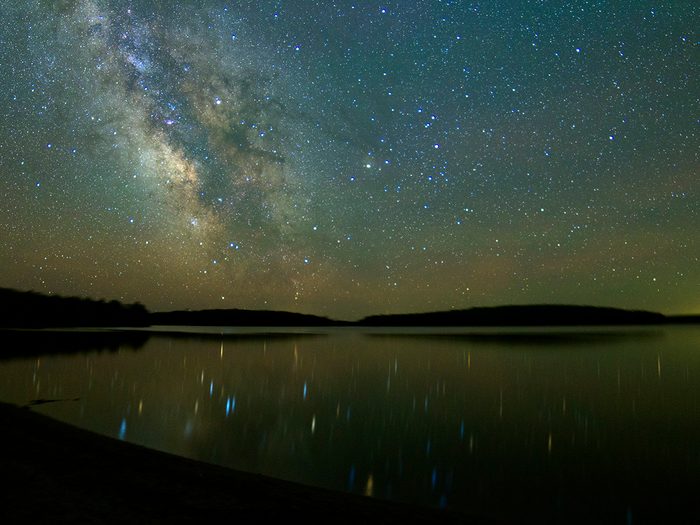
10 Unmissable Stargazing Destinations
With the days getting darker—and longer—there’s no better time to get outside and indulge in some amateur astronomy. If you’re fascinated by the mysteries of the universe, or simply want to take in the luminous magic of our galaxy’s celestial bodies, stargazing is a great activity for all ages and levels of experience. Fortunately, Canada is home to a number of world-renowned dark sky preserves and other areas safeguarded from artificial lighting—you won’t find brighter stars anywhere else.
From bucket-list destinations to humble hidden gems, here are the best locations for stargazing from coast to coast.
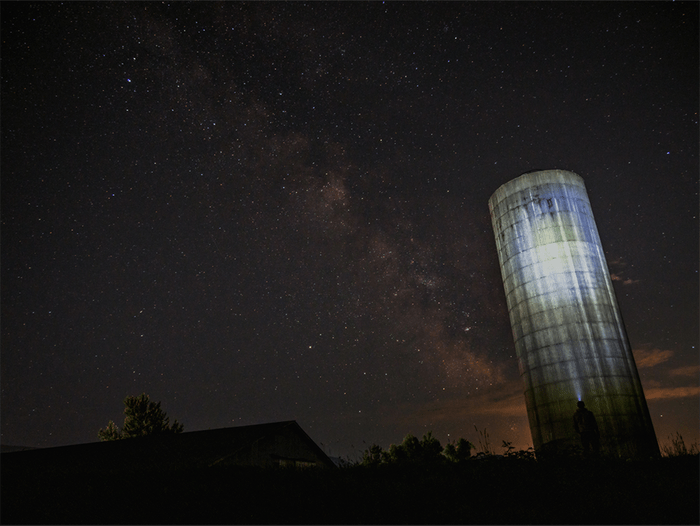
McDonald Dark Sky Park
British Columbia
Located in a valley near the cities of Abbotsford, Chilliwack and Mission, this dark sky park is a stargazing oasis. It’s shielded from the surrounding urban light pollution by Sumas Mountain, which makes it the perfect spot for a glimpse of the Milky Way. Before you pack your telescope, however, a bit of forward planning is required: the park is only open after dark for observing sessions hosted by the Fraser Valley Astronomers Society.
Pro stargazing tip: For optimal stargazing conditions, the environment needs to be as clear and dark as possible, says Phil Groff, executive director of the Royal Astronomical Society of Canada. If you can’t get out of the city, he suggests using something to block out the lights, such as simply putting your hands over your face like a visor. Don’t forget about the light from the moon, which can also interfere with your view—unless, of course, it’s the moon that you’re trying to see!
Here are more hidden gems in B.C. that are worth exploring.
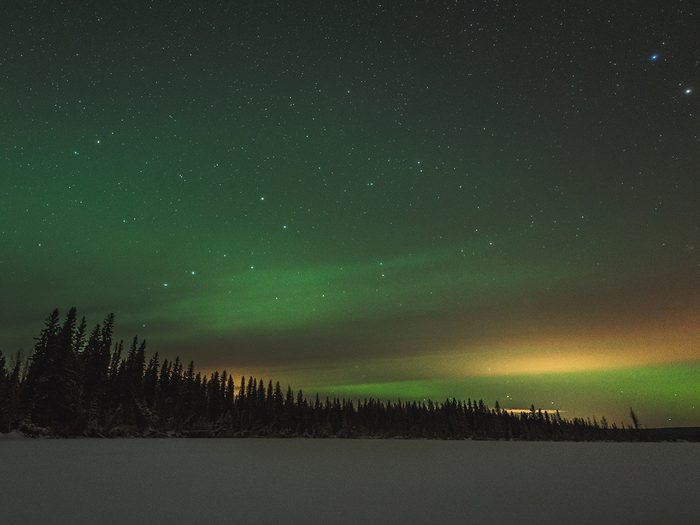
Lakeland Provincial Park
Alberta
With over a dozen backcountry camping sites, bountiful birdwatching and opportunities for ice fishing, you’ll want to spend at least a few days in Lakeland Provincial Park to fully immerse yourself in its sprawling wilderness. Take a midnight paddle along the province’s sole lake canoe circuit and watch the sky twinkle in the still water, or set up camp along the shore and curl up under the stars.
Pro stargazing tip: The key to a successful stargazing excursion is advanced planning, says Groff. He recommends using a printable star finder to see what’s in the sky at a specific time and date, or downloading a planetarium app like Stellarium. There are also different calendars that chart the movements of the planets in detail. Lastly, check the weather conditions—there’s nothing more frustrating than waiting for an overcast sky to clear.
Check out these inspired day trips from Edmonton.
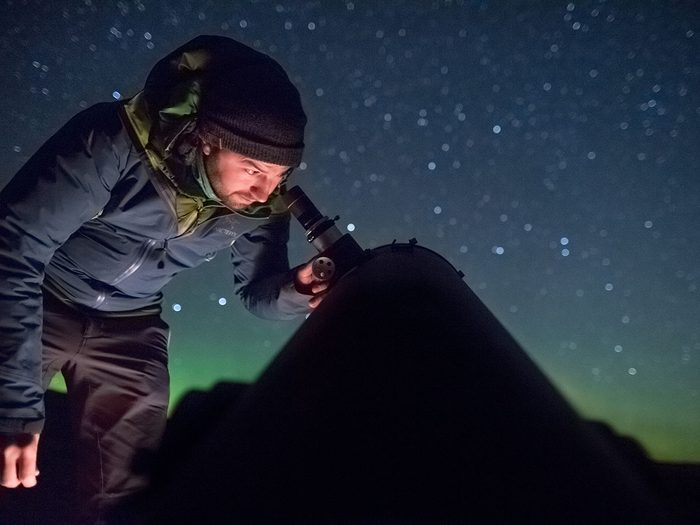
Grasslands National Park
Saskatchewan
One of the largest and darkest parks in the country, Grasslands is the place to see all that the night sky holds. Astronomers like to come here to observe “deep sky objects,” which encompass everything beyond our solar system, like star clusters and galaxies. Take in the incredible sights from three car-accessible stargazing locations: Two Trees Trail, Frenchman Valley Campground and Rock Creek Campground. Although your attention will no doubt be focused on the heavens, you’ll also want to keep an eye out for bison, rattlesnakes and rugged terrain.
Pro stargazing tip: No matter the time of the year, it’s always colder at night. A good rule of thumb is to dress for a temperature that’s 10 degrees colder than it actually is, says Groff. You won’t be moving around much while stargazing, so dress in layers and bring heat packs, particularly in the winter months.
Here are 10 national parks every Canadian needs to visit.
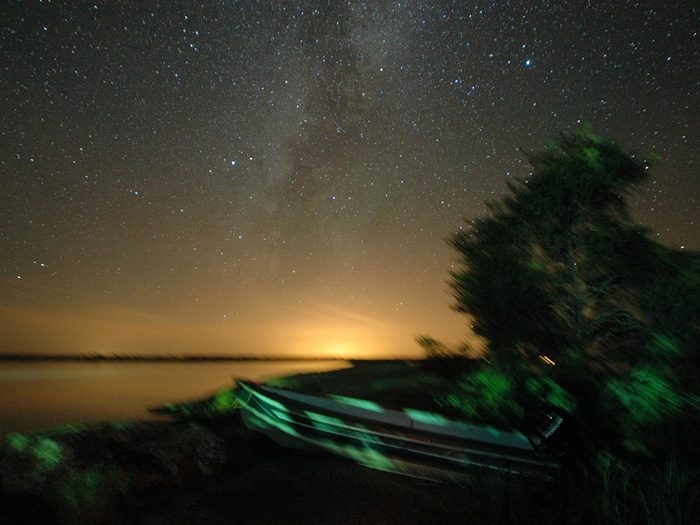
Whiteshell Provincial Park
Manitoba
Just an hour and a half drive east of Winnipeg, this all-seasons park makes the perfect weekend getaway, offering plenty of accommodations from campgrounds to cottages. After you’ve finished counting constellations, check out the park’s other astronomy-related wonder: West Hawk Lake, the deepest lake in the province and a popular spot for swimming and scuba diving, is a crater formed by a meteorite impact millions of years ago.
Here’s what it’s like hiking the Mantario Trail in Whiteshell Provincial Park.
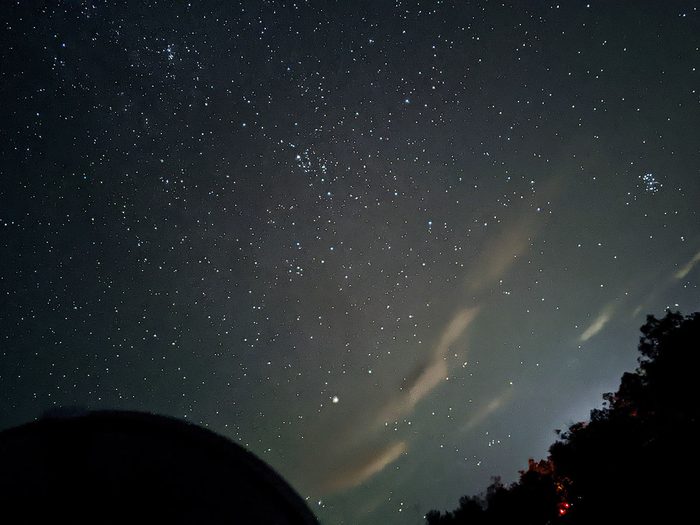
Torrance Barrens Dark Sky Preserve
Ontario
It’s easy to see why this conservation area in the heart of Ontario’s cottage country was designated Canada’s first dark sky preserve in 1999. Although it’s only a two-hour drive from Toronto, its unique landscape of hard, flat rock provides steady ground for setting up telescopes and cameras for night sky photography. In addition, the relatively low height of the trees and bushes means that stargazers get an unobstructed view of the sky from any angle.
Pro stargazing tip: Bring a camping chair (ideally one that reclines) or a plush blanket for maximum comfort. Not only will reclining prevent neck strain, but it will also put you in the best position to watch a meteor shower.
Explore more of Canada’s awe-inspiring natural wonders.
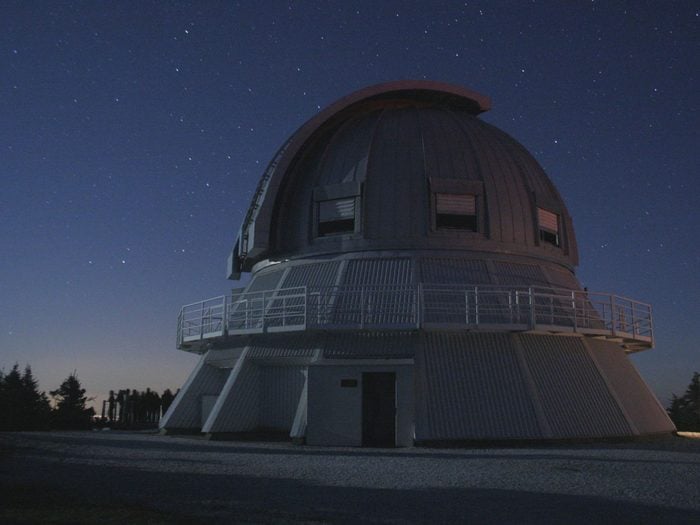
Mont Mégantic Observatory
Quebec
The Mont Mégantic Observatory—the fourth largest of its kind in Canada—and the surrounding region became the world’s first international dark sky preserve in 2007. Visitors can learn more about astronomy through tours and educational programs hosted by the on-site interpretive centre AstroLab, including a peek at the state of the art telescope (the entire structure weighs 24 tonnes!), which is owned and operated by local universities.
Pro stargazing tip: Put away those smartphone flashlights! Bright white or blue light will disrupt your night vision, which takes up to 30 minutes to readjust. Instead, use a red light when you need a bit of illumination while stargazing. You can buy red LED flashlights made specifically for astronomy, or try your hand at a DIY version by wrapping a conventional flashlight in red cellophane or plastic.
Discover more hidden gems in Quebec.
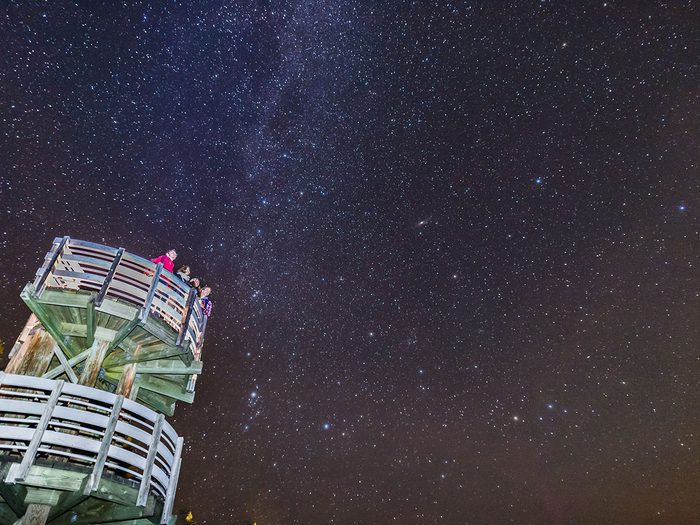
Kouchibouguac National Park
New Brunswick
Head to the east coast of New Brunswick to stargaze among Kouchibouguac National Park’s signature sand dunes, colourful salt marshes and lagoons. It’s one of 13 dark sky preserves maintained by Parks Canada, which protects more dark skies than other agency or jurisdiction in the world. We recommend spreading towel on the soft sand at Kellys Beach for an ocean-side view of the sky, complete with the calming sounds of the Atlantic.
Pro stargazing tip: Most of the time, your eyes are the best equipment for stargazing. For those who want to upgrade, a decent pair of binoculars is a good place to start. If you’re looking to invest in a telescope, Groff suggests skipping the bells and whistles, and going with a model that’s simple and portable. “The best telescope to buy is the one you’ll actually use.”
Here are more essential experiences on the east coast of Canada.
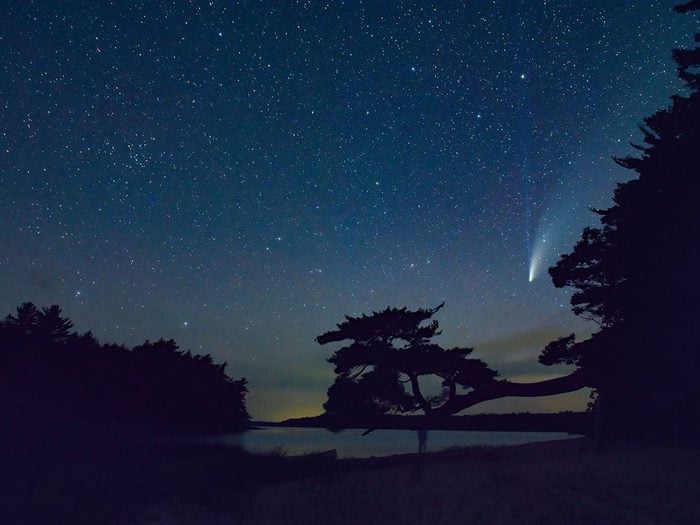
Kejimkujik National Park
Nova Scotia
Both a national park and historic site, Nova Scotia’s only dark sky preserve is rich in both natural wonders and culture. Located in the Bay of Fundy and Annapolis region, Kejimkujik takes its name from Mi’kmaw language, in honour of the region’s first inhabitants, the Mi’kmaq. Night-time canoe excursions and historical-themed hikes provide unforgettable opportunities for stargazing. (Here are more historical landmarks every Canadian should visit.)
Pro stargazing tip: According to Groff, the best way to kick off a stargazing session is to locate the moon and nearby planets like Venus, Mars and Jupiter. Because they’re bright and don’t twinkle, it’s easy to pick them out with the naked eye. When you’re casually scanning the night sky, Groff recommends defocusing your eyes: This may help you spot fast-moving objects like meteors and can even allow you to differentiate between the colours of stars.
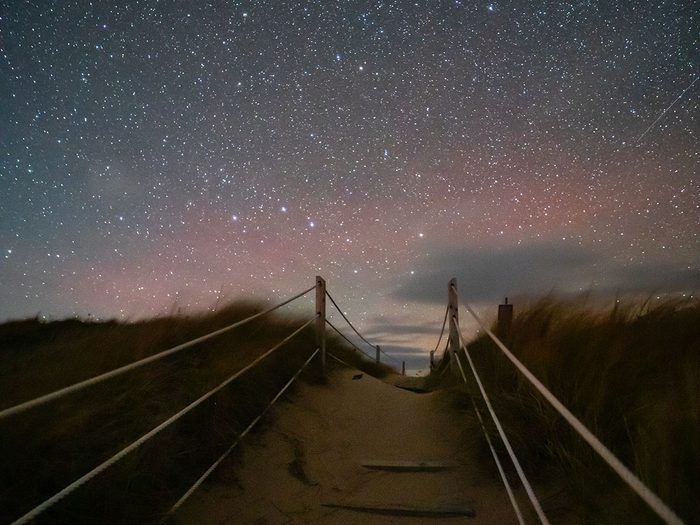
Cavendish Beach
Prince Edward Island
Located in Prince Edward Island National Park, Cavendish Beach is part of the area perhaps best known as the place that inspired Anne of Green Gables. The low light pollution and a magnificent backdrop of red cliffs and sculpted dunes also makes it a serene locale for contemplating the night sky.
Pro stargazing tip: Even if you can’t stargaze from your own backyard, there are plenty of ways to participate from home, including live streams and online classes where you can learn more about astronomy from the experts.
These are Canada’s best beaches, as voted by you.
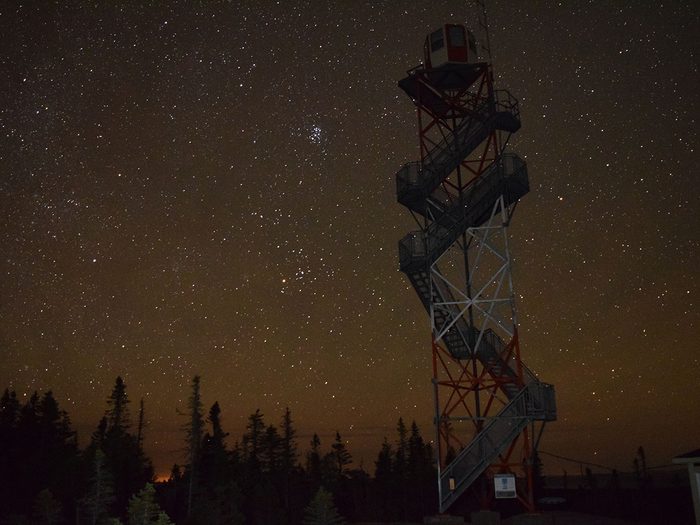
Terra Nova National Park
Newfoundland and Labrador
One of the newest dark sky preserves in Canada, this 400-square-kilomtere park sits on the northeast coast of Newfoundland about a three-hour drive from St. John’s. Head to Sandy Pond for the darkest skies or walk to the former fire-watch station at Ochre Hill for a panoramic view. If you’ve got the stamina, climb up to the park’s highest point at Blue Hill and be rewarded with a jaw-dropping lookout. For an experience unlike any other, stay in one of the park’s futuristic water droplet-shaped cabins, which includes a hammock loft where you can doze off under a dreamy sky.
Next, take a closer look at Canada’s contributions to space exploration.